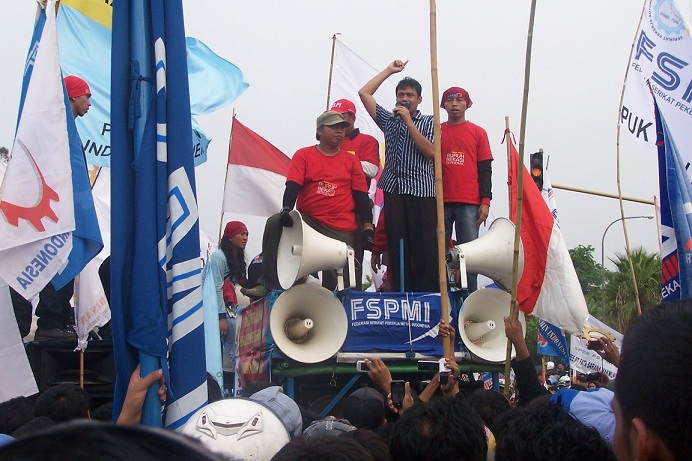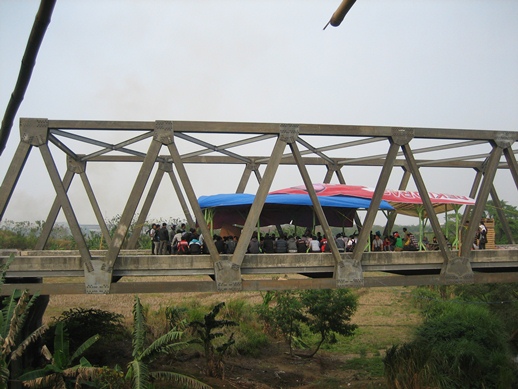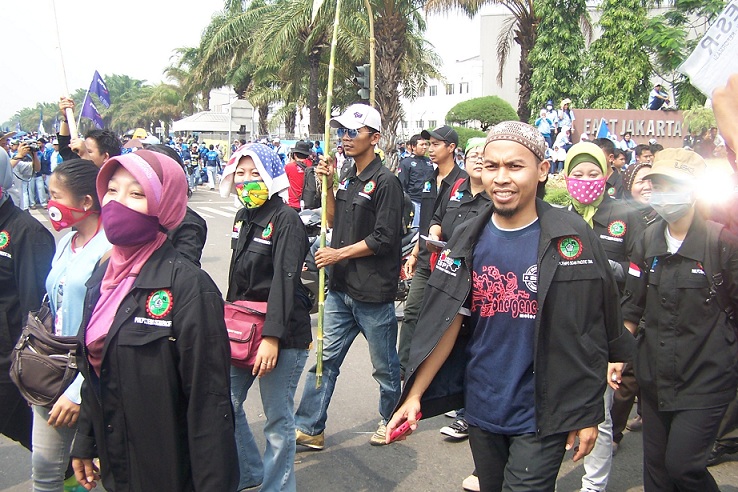Ellen Roberts
Workers joining the strike in BekasiOcha Hermawan |
‘Are you ready to be sacked?’ ‘We’re ready!’, answers the crowd of 50 factory workers. ‘Are you ready to be sacked?’, asks the union leader again. ‘Remember the union is not a god. We cannot protect you. All you have is each other, but if you are united you will be strong.’
The workers, all men, are from an Indonesian sheet metal factory in one of the industrial zones east of Jakarta. Their factory is yet to be unionised, but they’re all keen to improve their wages and conditions. ‘Okay, those of you who have a mobile phone get it out. We’re going to do some calculations,’ says the union leader. Together the group calculates their monthly wage including overtime. It comes to Rp.900,000, around $A90. This is half the legal minimum wage. ‘For that amount of money you may as well be a stone breaker. Do you want to break stones? If you want to fight to achieve your rights you have nothing to lose.’
The sheet metal workers are meeting with the union leader on an unused road bridge that juts out over a small river in Bekasi, east of Jakarta. Bekasi is home to five massive industrial parks, centres for Japanese, Korean, Chinese and Indonesian automobile, electronics, pharmaceutical and other factories. The bridge was abandoned after opposition from the local villagers prevented it from being completed, and several months ago the Indonesian Metalworkers Union (FSPMI) took it over for union meetings. They now have a 24 hour presence here.
 |
Said Iqbal addresses the strikersOcha Hermawan |
A national strike
Tonight it’s 2 October 2012 and the bridge is even more crowded than usual. Tomorrow, factory workers will strike across Indonesia and the workers in Bekasi are expected to turn out in force. The workers are striking over the use of third party labour hire companies, also referred to as outsourcing. Of the 30 million people in formal labour in Indonesia, it is estimated that 20 million are employed by labour hire companies rather than directly by their factory or other main employer. These arrangements lead to lower wages and job insecurity.
On paper, Indonesian labour law restricts the use of outsourcing to catering, security and other ancillary services, but in practice its use is much more widespread. In a statement for the press, the coalition of unions calling the national strike blamed the dominance of outsourcing in Indonesian factories on the unwillingness of the state to intervene in industrial relations and enforce existing laws.
At 8am the next day, we watch the striking workers streaming from the 90 factories in the East Jakarta Industrial Park to join the demonstration. Each of the five industrial parks in Bekasi will see a day long strike and demonstration. From a distance we can see around 50,000 workers gathered around what the Metalworkers Union calls their Commando Car, which is fitted out with a sound system and massive speakers.
The mood is jubilant. Union flags proliferate and between speeches the crowd dances to union songs and the latest Indonesian pop music. Songs by Iwan Fals, the folk hero of the reformasi period that led to the fall of Suharto, are included in the play list. It is sweltering and the crowd appreciates the periodic spray from a fire hose.
 |
The disused bridge that has become a centre of labour activismOcha Hermawan |
That afternoon, back at the bridge, union leaders and workers crowd around the television watching coverage of the strike. The Indonesian media focuses its coverage on the controversial practice of ‘sweeping’, where unions and workers enter a factory by force and demand all workers there join the strike. The union says sweeping gives vulnerable workers a chance to strike without fear of repercussions from their employer. Sofjan Wanandi from the Employers Association told the Jakarta Post that workers were intimidated into joining the strike, and that they really wanted to keep on working.
The Indonesian media chooses not to focus on the significance of Indonesia’s first ever national strike: not only what it means for the 2.8 million workers who joined the strike, but also for the united unions who felt strong enough to call it. Said Iqbal, who is the president of the FSPMI as well as the leader of one of Indonesia’s confederation of unions, the KSPI, has been credited with healing splits in the union movement that have existed since the fall of Suharto.
New found unity
An Australian lawyer working with the FSPMI says, ‘Union leaders from the FSPMI are transforming industrial relations in Indonesia, not only between employers and workers, but also between unions. What continues to impress me is the dedication of the people working for the FSPMI. Many work for free, living off donations and spending all their time talking to workers about their rights. Even some high up officials are not paid,’ she says.
Part of the success of the unions is their ability to combine Islam with the struggle for workers’ rights. This enables them to remain relevant to the lives of workers, and the principles of Islam assist the workers in making arguments for better treatment. In concluding his speech in East Jakarta Industrial Park, FSPMI leader Said Iqbal tells workers, ‘the angels will come down and take you to heaven for what you have done today.’
Ellen Roberts (roberts.ellen.x@gmail.com) is an environmental campaigner and legal advocate based in Melbourne.
